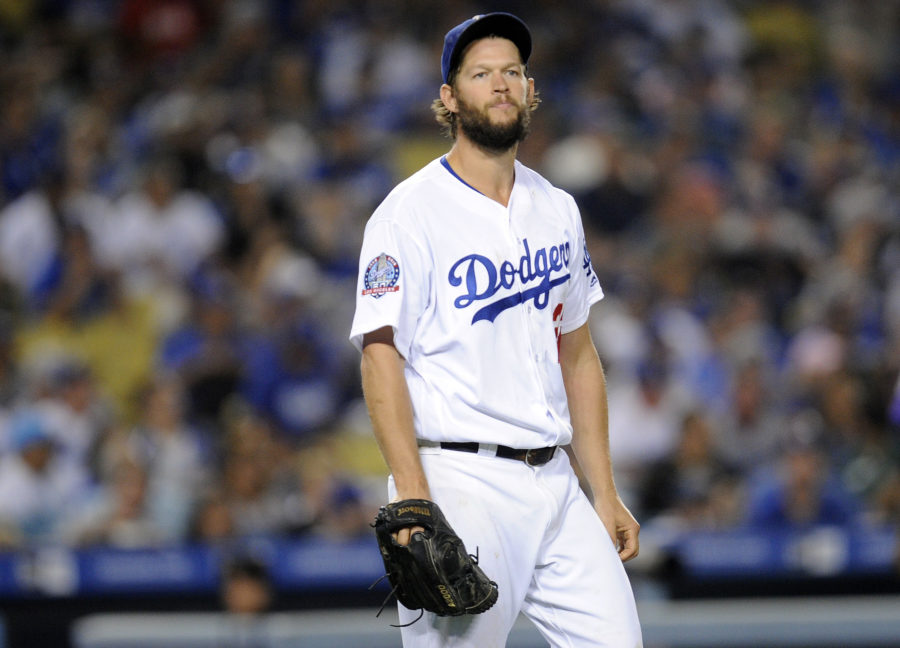Sitting atop the National League West, having won 17 division titles including the last six, the Los Angeles Dodgers are once again the favorites to repeat. With Clayton Kershaw once again ailing, their hopes may take a hit.
Last month, it was announced that Kershaw was dealing with shoulder inflammation, thought to be a product of increasing his offseason progression.
The veteran left-hander has incurred multiple injury-plagued years, including a total of 74 starts the past three regular seasons. That total is down from his previous three-year total between 2013 and 2015 of 93. In those starts, he racked up 667 innings pitched. With only 485.1 innings the past three years, those efforts appear to be taking a toll.
Multiple back injuries played a large role in his missed starts the last trio of years, resulting in the Dodgers being forced to supplant him in the rotation.
This year, with his shoulder injury flaring up in Spring Training, the team is once again looking at an uncertain future. The questions come after the club awarded their ace with a 3-year, $93 million deal to avoid free agency.
His absence creates a ripple effect in their outlook, with the Colorado Rockies subsequently being affected.
If Kershaw is forced to miss time this year, the onus will be placed on the shoulders of last year’s rookie sensation, Walker Buehler.
In 23 starts last season, the youngster posted a 2.62 earned run average in 137.1 innings and racked up 151 strikeouts. The efforts led the former Vanderbilt standout to a third-place finish in NL Rookie of the Year voting, with only Ronald Acuna Jr. and Juan Soto finishing ahead of him.
Adding in his minor league stints, last season was the most innings in Buehler’s post-collegiate career.
With the rotation all being pushed forward a spot, Buehler would be the staff’s new ace, followed by Hyun-jin Ryu and a combination of Rich Hill, Kenta Maeda and Ross Stripling who would be allocated a spot in Kershaw’s stead.
That rotation, in a vacuum, still likely beats out the Rockies staff.
The problem for the NL West’s leader is that injuries have also plagued Ryu and Hill. Hill, entering his 14th season at 39 years old, has only started north of 30 games once in his career, with blisters and various ailments placing his day-to-day status each year in question. Ryu has only one season of 30 starts as well, though his sample size is merely five seasons.
In their lineup, the Dodgers also let both Yasmani Grandal and Manny Machado walk, traded Yasiel Puig and are relying on Corey Seager to return from Tommy John surgery with minimal complications.
In a five-game series to begin the postseason, if the Dodgers injuries come to fruition again, the Rockies could oppose Buehler with Kyle Freeland, Maeda with German Marquez and Stripling or Julio Urias with Jon Gray. Outside of the first game, the Rockies would likely hold the advantage in each if Gray’s recent outings continue into meaningful games.
For the final two games, the Rockies could likely split behind either a second start from Freeland or a communal bullpen effort, giving them a series win.
If healthy, the Dodgers, led by Kershaw, can trot out a proven starter or young star in each game, with few holes in their rotation. With Urias returning from surgery and both Brock Stewart and Caleb Fergusen able to fill in among others, even the team’s worst-case scenario still likely resides in the upper half of the NL.
In their utopian circumstance, the Dodgers can trot out a greater starter in the majority of games opposing the Rockies.
The Rockies rotation also carries several question marks. Will Gray rebound? Can Tyler Andersen pitch more like his 2016 stint (3.54 ERA in 114.1 innings)? Is Jeff Hoffman going to finally find his groove and head the final spot of the rotation?
Both teams carry several questions on the mound, with both bullpens also being a mystery. The Dodgers are still the favorites, and rightfully so.
If Kershaw continues to degrade, the Rockies prospects brighten.
